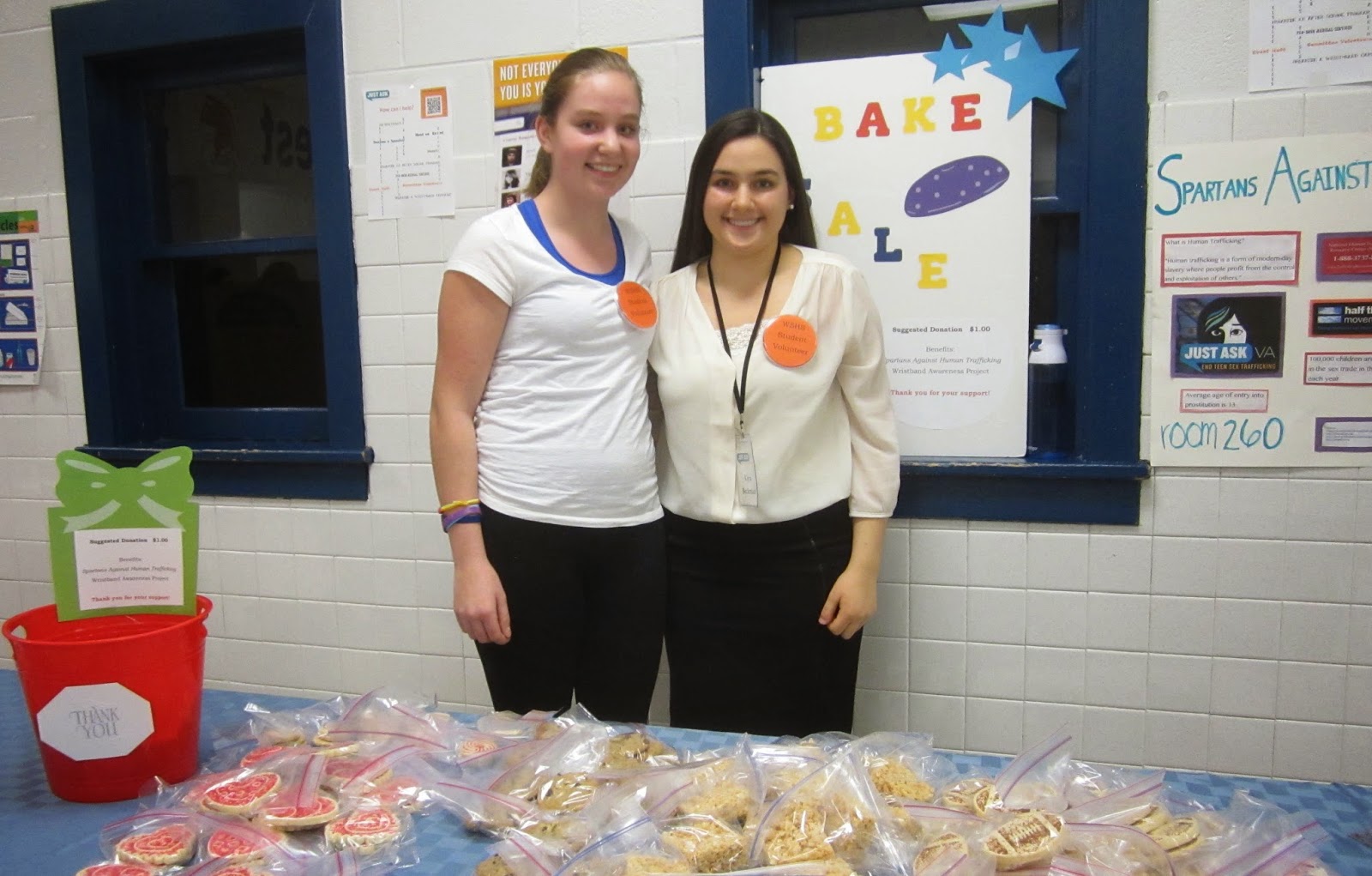Any Fairfax County teen could become a sex trafficking victim
 |
| West Springfield High School students Alyssa Wenklar (left) and Kyra Beckman, are members of the Spartans Against Human Trafficking club. |
Any teenager in Fairfax County could be at risk for becoming a victim of sex trafficking. It’s happened to youths from every school, ethnicity, and family income level, said Det. Bill Woolf during a program on human trafficking at West Springfield High School Jan. 28.
The program was sponsored by the Just Ask Prevention Project, a campaign aimed at ending teen sex trafficking. Just Ask is a collaboration of the Fairfax County Police Department, Fairfax County Public Schools, and other agencies and organizations. [Check out this video for more information.]
The Department of Justice estimates 100,000 children in the United States who are U.S. citizens are involved in commercial sex every year, Woolf said, while other organizations put the number at 300,000. Virginia ranks number 5 in terms of the number of calls to the National Human Trafficking Resource Center hotline [888-373-7888].
Woolf, who serves on the police department’s Human Trafficking Unit, said he’s gotten 156 leads since the task force started in October 2013, and 108 victims have been recovered. One suspect arrested last week was involved with 72 victims.
About 17 percent of the cases are gang related; in other cases, the perpetrator is a pimp or family member. Gangs are moving into sex trafficking because it’s “high profit and low risk,” Woolf said. The sex trade is especially lucrative for gangs because there is high demand here, with lots of men able to pay.
Woolf explained how perpetrators trying to lure youths into the sex trade “lie in wait to exploit a child’s vulnerabilities.” It’s all about mental
manipulation and coercion. In some cases, the victims continue to go school and sleep in their own
beds. “It’s a myth that victims are forced into a van and taken to
another state or country.”
The problem, Woolf said, people don’t realize the threat is out there “and we do not see what is going on right in front of our faces.”
The exploiters target teens who are accessible (not closely monitored by parents), suggestible (have low self-esteem), and vulnerable (feel that no one understands them). Places where victims are sought include malls, social hangouts, bus stops, youth groups, schools, afternoon “skip parties” – and most often, social media.
Why do victims fall for this? Woolf listed several reasons: peer pressure, it seems fun and exciting, the lure of financial gain (as much as $2,000 a night), the possibility of improving their social status, to get protection from bullies, and to gain a sense of belonging.
Victims often don’t even realize they are victims, Woolf said. They don’t ask for help because they blame themselves. And once trapped, they are expected to recruit their friends. It doesn’t only happen to girls, either; boys and transgendered youths have also gotten caught up in sex trafficking.
Woolf wants teens and their parents to realize it could happen anywhere, noting he’s dealt with three cases involving West Springfield students. Lance Fitzmorris, a parent and Just Ask volunteer, knows of a teen from a well-off family in McLean with a 3.9 GPA who
was victimized. “Every child is a potential target,” he said.
“Parents are the first line of defense,” Fitzmorris said He urges parents to talk to their children about what their teens are doing and with whom. A potential exploiter won’t bother with a teen who says she has to check with her mother before going anywhere.
Recruiting teens begins with a manipulation phase, which could include gifts and the promise of a relationship. Then it escalates into real coercion, he said, with “the threat of violence, the threat of exposure, and withholding love. Your child becomes a commodity.”
Liz Payne, director of health education for Fairfax County Public Schools, said FCPS is incorporating information on trafficking into its family life education curriculum.
Payne listed several warning signs that could indicate a teen is a victim: changes in mood, such as isolation, angry outbursts, or depression; sneaking out of the house at night; skipping school; dressing differently; new friends; lack of interest in school or sports; and substance abuse.
So, what is the solution? It’s education, prevention, and intervention, Woolf says. “We have to get the conversation going. We have to ask the right questions.”


sensationalize a headline much?
That was the message of the presenters. It doesn't just happen to poor kids, immigrants, or teens with troubled family lives.
On a somewhat positive note, with a few exceptions, any baby born in Fairfax County today could become President of the United States. I state "somewhat positive" because for someone to want to be President they have to either suffer from an over-inflated ego or masochism (or both).
For a true positive counterpoint to this feel bad story that is supposed to provide information to help caring parents and other adults prevent our children from falling into the arms of sex traffickers, in honor of this weekend's Super Bowl and gender equality, consider this headline –
"Any Fairfax County Teen could become an NFL Quarterback or a crime fighter (woman or man in Blue (yes, a cop)"
As someone who attended this presentation, thank you for reporting the important message and information shared. I hope a similar event will take place in the Annandale/Falls Church area…possibly co-sponsored again by the FCPD/FCPS/Sup. Gross. Yes, we ALL need to be educated about what's going on in our community.